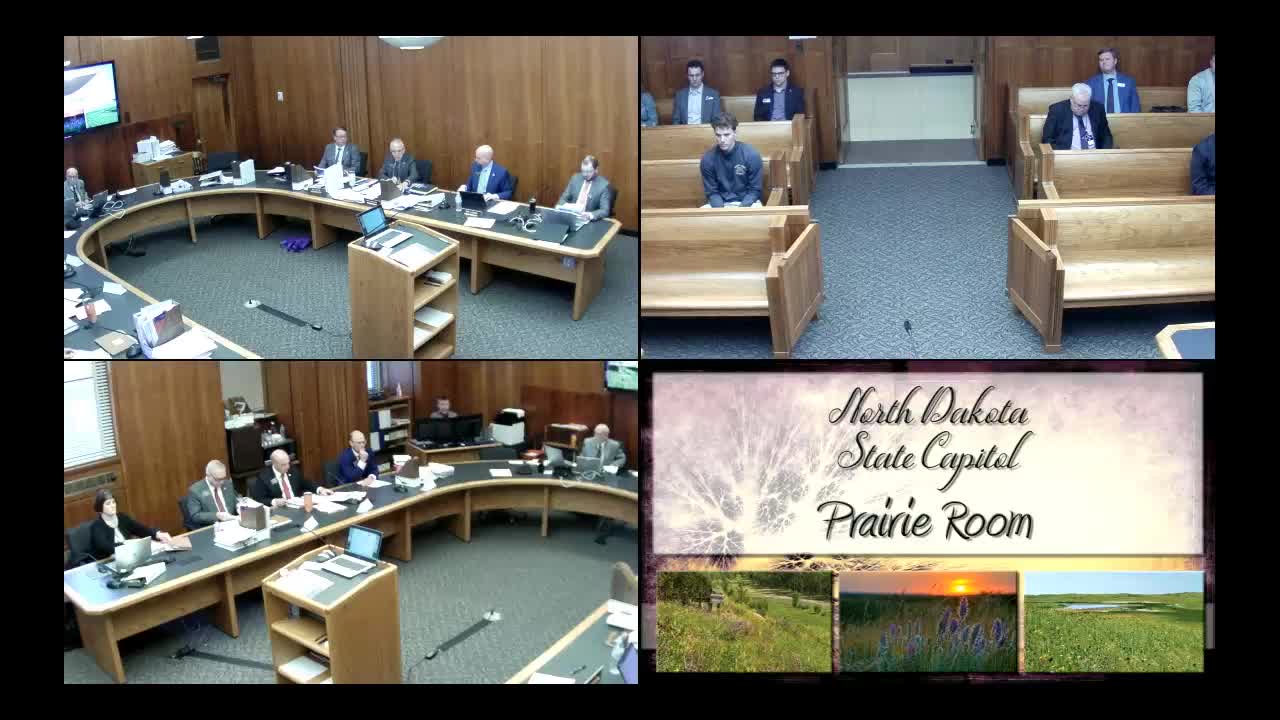Conference committee weighs water funding plan, $200 million line of credit and new attorney role after SB 2276
Get AI-powered insights, summaries, and transcripts
Subscribe
Summary
A legislative conference committee discussed implementation details of Senate Bill 2276, a proposed attorney FTE for water disputes, reduced funding for Bismarck flood protection and a $200 million line of credit to backstop the Resources Trust Fund, with lawmakers voicing concern that accelerating large projects could squeeze smaller ones.
A legislative conference committee meeting on water resources discussed how to implement Senate Bill 2276, proposed staffing and funding changes for the State Water Commission and a cash strategy for the Resources Trust Fund.
Chairman Swiatek opened the discussion by describing provisions in Senate Bill 2276 that would let a joint water resources board request assistance from North Dakota Mediation Services when the joint board cannot agree on the necessity of a project. He and Senator Sorvaug said they had discussed the bill and related resource needs with the governor and agreed the changes increase the likely workload for the water resources staff.
Committee members raised three interrelated implementation issues: adding an attorney position focused on water matters, funding for Bismarck flood protection, and a proposed $200 million line of credit to backstop the Resources Trust Fund.
Senator Sorvaug and other members said the bill and recent requests by the State Water Commission point to a need for an additional full‑time attorney dedicated to water matters. The committee said the position had been in the commission’s original budget request but was not accepted by both chambers; committee members recommended reconsidering that FTE in light of SB 2276’s new dispute-resolution language.
On flood protection, committee members described an initial funding concept of $20 million for City of Bismarck flood projects. The conference committee said it would propose $14 million up front, with a possible additional $3 million to be considered during the interim, describing the $14 million as fitting current priorities while leaving room to analyze further needs.
Reese Haas, director of the Department of Water Resources, explained the committee’s cash‑management proposal and the line of credit concept. "The line of credit, we visualize that as our overdraft privilege similar to a checking account. You'd have that overdraft. Ideally, you'd never tap into it," Haas said, adding the line would allow the commission to accelerate project authorizations and bidding so projects can move into construction seasons rather than being delayed across biennia.
Staff presented a 14‑year planning template that estimates about $3.4 billion in water project needs over that timeframe and a Resources Trust Fund snapshot showing roughly $806.5 million in total with a $200 million line of credit and bonding capacity for regional projects described as "Southwest" in the materials. Staff told the committee the State Water Commission meets every other month and that, under the presented cashflow model, the nearest projection for needing the line of credit would be around 2032.
Several senators voiced concern that using a line of credit to accelerate large projects could in future biennia crowd out smaller municipal, rural and irrigation projects if revenues decline. Senator Beckett (identified in the transcript with variant spellings) asked whether accelerating large projects would leave smaller projects with less funding when the line of credit must be repaid from Resources Trust Fund revenues. Committee members and staff acknowledged the risk, noting it is a budgetary decision for the legislature and that past revenue shocks—cited in the meeting—have required project reallocation.
Committee members also discussed Section 10 of the bill, which would add powers and duties to the Water Topics (overview) committee; the house side agreed to review the language for any minor wording changes before the next meeting and tasked staff (Alex, referenced in the meeting) to assist with drafting alternate language.
No formal vote or final appropriations were recorded in this session; committee members set directions for language revisions, asked staff to revise budget figures, and indicated several items would be further examined during the interim. The meeting record shows discussion only—committee members did not adopt a final, binding appropriation or amend the bill during this session.
The committee also discussed operational timing: staff said that emergency clauses in past sessions have not always prevented construction‑season delays if approval timelines slip, and that improved scheduling of State Water Commission meetings (every other month) is intended to reduce that risk. Members noted that the plan includes conservative revenue assumptions (including a scenario with oil prices as low as $30 per barrel) and a three‑and‑a‑half year "landing strip" of budget flexibility to minimize state risk under a low‑revenue scenario.
The committee adjourned after directing staff to prepare revised language and budget adjustments for its next meeting.
